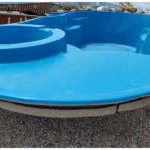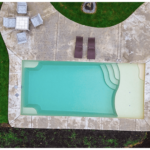Información actualizada April 5, 2024
Fiberglass vs. Concrete Pools – In case you’re thinking about including a pool to your house, you is probably questioning which sort of pool is notable for you. While there are a spread of various pool materials to be had, of the most famous are fiberglass and concrete.
Table of Contents
What Are Fiberglass pools?
Fiberglass swimming pools are made from a unmarried piece of molded fiberglass, that’s hooked up in an excavated hole within the ground. They arrive in a spread of sizes and styles, and may be custom designed to meet your unique desires. Fiberglass swimming pools have a smooth, non-porous floor that is evidence towards algae growth and requires much less preservation than distinctive varieties of pools. They will be additionally lots much less in all likelihood to growth cracks or leaks over the years.
What Are Concrete pools?
Concrete pools, also known as gunite pools, are made from a combination of concrete and sand this is sprayed onto a steel framework. They may be then finished with plaster or tile to create a easy surface. Concrete swimming pools are enormously customizable and may be designed in any form or length. They are also very durable and may closing for decades with right maintenance.
Fiberglass vs. Concrete swimming pools: cost contrast
In relation to price, fiberglass swimming pools are commonly greater high priced than concrete swimming pools. The charge of a fiberglass pool will rely upon the scale and shape of the pool, as well as any additional abilities you need, which includes a spa or waterfall. Concrete swimming pools are commonly less pricey, however the fee can range relying at the complexity of the design and the kind of end you choose.
Certainly, here’s a cost comparison table between fiberglass and concrete pools:
| Cost Comparison | Fiberglass Pools | Concrete Pools |
|---|---|---|
| Initial Cost | Lower, ranging from $20,000 to $40,000 | Higher, ranging from $30,000 to $50,000 |
| Installation Cost | Lower, averaging around $45-$85 per square foot | Higher, averaging around $50-$100 per square foot |
| Long-Term Maintenance Cost | Lower, requiring fewer chemicals and less cleaning | Higher, requiring more chemicals and cleaning due to porous surface |
| Resurfacing Cost | N/A, as fiberglass pools do not require resurfacing | Higher, averaging around $10,000-$20,000 every 10-15 years |
| Energy Cost | Lower, as fiberglass pools are more energy-efficient due to better insulation | Higher, as concrete pools lose more heat due to their porous surface |
Long-time period fee
While concrete pools can also have a decrease preliminary value, they may be extra highly-priced in the long run. This is because they require more protection, maintenance, and resurfacing than fiberglass swimming pools.
Concrete swimming pools are extra at risk of cracks, leaks, and stains, which may be high priced to repair.
Fiberglass swimming pools, then again, are greater proof against put on and tear and require less safety. This can prevent cash on protection and chemical substances over the existence of the pool.
Fiberglass vs. Concrete swimming pools: set up manner
The installation manner for fiberglass swimming pools is usually faster and easier than for concrete pools.
Due to the fact fiberglass pools are pre-constructed and certainly want to be installed in a dug hollow, the set up system can normally be finished in only some days.
Concrete pools, but, require an extended set up technique, due to the fact the concrete desires time to heal earlier than the pool may be packed with water.
Complexity
Concrete swimming pools can be constructed in any shape or length, making them a first rate choice in case you need a custom pool layout.
Fiberglass swimming pools, on the other hand, are to be had in a restrained range of patterns and sizes, so you’ll want to select from the to be had options.
But, fiberglass pools stay a top notch opportunity for plenty homeowners, imparting numerous designs and may be custom designed with additional capabilities which includes waterfalls, jets, and lighting.
Fiberglass swimming pools vs. Concrete: durability
Each fiberglass and urban pools can closing for decades with right protection. Fiberglass pool covers have a popular lifespan of 25 years or greater, while concrete pools can last up to 50 years or extra. However, the beneficial life of a swimming pool also relies upon on factors that encompass the weather, the use and the protection.
Put on resistance
Fiberglass pools are more proof against wear and tear than concrete pools. They’re much less probably to develop cracks, leaks, or floor damage over time. Fiberglass pool shells are also much less at risk of harm from tree roots or floor movement. Concrete pools, alternatively, can be greater susceptible to those kinds of damage and require greater safety and maintenance.
Fiberglass vs. Concrete pools: protection
Fiberglass swimming pools require less maintenance than concrete pools, as their clean, non-porous surface is proof against algae boom and requires fewer chemicals to maintain clean. Concrete pools, then again, require extra maintenance, as their porous floor can harbor algae and micro organism if now not nicely cleaned.
Restore
As mentioned in advance, concrete pools are extra at risk of cracks, leaks, and marking, which can be highly-priced to restore. In evaluation, fiberglass swimming swimming pools are much less probably to extend the ones problems, but in the event that they do, they may be repaired short and resultseasily. Fiberglass pool shells may be patched, sanded, and painted to repair minor damage, whilst concrete swimming pools may require greater vast maintenance, consisting of resurfacing or retiling.
Fiberglass vs. Concrete swimming pools: Aesthetics
Concrete pools provide more design alternatives than fiberglass pools. They can be built in any form or length and can be custom designed with diverse functions, consisting of integrated spas, waterfalls, and fountains. Fiberglass pools, on the other hand, have a limited range of sizes and styles, but they nevertheless provide a diffusion of designs and can be custom designed with additional functions.
Textura y coloration de la superficie
Concrete pools can be completed with various soil textures and colors, such as pebbles, tiles or plaster. This allows for greater flexibility and design customization. However, fiberglass pools have a smooth, non-porous floor that is easy to smooth and secure, but may not offer as many aesthetic options.
Fiberglass vs. Concrete swimming pools: Flexibility
Fiberglass swimming pools are commonly much less flexible than concrete swimming pools when it comes to design alternatives. They’re pre-made and can not be customized past the to be had alternatives. Concrete swimming pools, alternatively, offer almost limitless design alternatives, permitting you to create a actually precise pool that meets your specific needs and choices.
Piscinas de Fibra de Vidrio vs. Hormigón: Impacto Ambiental
Energy performance
Fiberglass swimming pools are greater strength-green than concrete pools. That is because they have a lower floor location-to-water ratio, which reduces warmness loss and evaporation. Fiberglass pool shells are also higher insulated than concrete pools, which means that they require much less electricity to warmness and keep. Moreover, fiberglass swimming pools can be mounted with eco-friendly features along with solar heating structures and LED lighting fixtures.
Chemical use
Both fiberglass and urban pools require chemical substances to preserve water satisfactory and save you micro organism growth. However, concrete swimming pools require greater chemical substances than fiberglass pools because of their porous floor, which could take in chemical compounds and requires greater frequent dosing. This can have a bad effect at the surroundings and might boom chemical fees through the years.
Fiberglass vs. Concrete swimming pools: Resale price
Fiberglass pools usually have a higher resale price than concrete pools, as they require less maintenance and are much less probably to broaden cracks or leaks through the years. Additionally, the glossy, current look of fiberglass swimming pools is greater popular with homebuyers than the conventional look of concrete pools.
Fiberglass vs. Concrete swimming pools: safety
Each fiberglass and urban swimming pools may be made safe with the addition of safety features consisting of fencing and pool covers. However, concrete swimming pools can be greater slippery than fiberglass swimming pools, because the porous floor can harbor algae and micro organism that could make the floor slick.
Fiberglass vs. Concrete pools: consolation
Fiberglass pools offer a greater comfortable swimming enjoy than concrete swimming pools, because the easy, non-porous surface is mild on the pores and skin and much less in all likelihood to reason scrapes and scratches. Moreover, the clean surface of fiberglass swimming pools reduces the risk of catching a suit at the difficult surface of a concrete pool.
Fiberglass vs. Concrete swimming pools: end
In terms of deciding on among a fiberglass pool and a concrete pool, there may be nobody-length-suits-all answer. Both kinds of pools have their pros and cons, and the exceptional desire for you’ll rely upon your specific desires, alternatives, and price range.
Information Fiberglass swimming pools
Execs of Fiberglass pools
Brief installation: Fiberglass swimming pools may be installed fairly quick as compared to different forms of swimming pools, saving you time and problem.
Easy surface: The gel-lined floor of fiberglass pools is gentle at the pores and skin and forestalls algae build-up.
Low renovation: due to their clean end, fiberglass pools require much less maintenance than concrete pools.
Energy efficiency: The non-porous surface reduces chemical and water utilization, leading to higher electricity efficiency.
Decreased Chemical utilization: The clean floor of fiberglass pools requires fewer chemicals for water maintenance.
Cons of Fiberglass pools
Constrained Customization: Fiberglass swimming pools are available pre-made styles and sizes, proscribing your customization alternatives.
Transportation restrictions: the dimensions and shape of the pool may be confined by using transportation limitations.
Fiberglass Pool set up manner
The installation procedure involves excavating the web page, placing the pre-manufactured pool, and backfilling round it. Right preparation and leveling of the ground are important for a a hit fiberglass pool set up.
2. Exploring Concrete swimming pools
What are Concrete pools?
Concrete pools are built on-web page with the aid of constructing a framework, that’s then covered with concrete and other materials. This method lets in for entire customization, supplying you with the liberty to create a unique pool layout.
Pros of Concrete pools
Layout Versatility: Concrete pools offer limitless design opportunities, making them best for growing custom shapes and functions.
Toughness: A properly-constructed concrete pool can final for many years, offering lengthy-term fee.
Robust creation: Concrete swimming pools are robust and can withstand harsh climate conditions.
Property cost: Concrete pools can boom the resale value of your home.
Cons of Concrete swimming pools
Lengthy installation: constructing a concrete pool can take several weeks or months, requiring greater staying power at some stage in the construction method.
Better maintenance: The porous floor of concrete pools makes them more prone to algae boom, requiring ordinary maintenance.
Concrete Pool construction process
The development manner includes building a reinforced steel framework, spraying concrete over it, after which finishing the surface with plaster or tiles.
3. Comparing Fiberglass and urban swimming pools
Sturdiness and Lifespan
Fiberglass pools have a lifespan of round 25 years, at the same time as properly-maintained concrete pools can ultimate for greater than 50 years.
Cost assessment
Fiberglass pools have a decrease preliminary fee due to their quick set up, whilst concrete pools have a better prematurely fee but offer lengthy-term price.
Design Flexibility
Concrete swimming pools offer unmatched design flexibility, permitting you to incorporate diverse features like waterfalls, vanishing edges, and custom shapes.
Protection necessities
Fiberglass pools require much less maintenance and chemical utilization compared to concrete swimming pools, making them greater fee-effective in the long run.
Environmental effect
Both styles of pools have environmental influences, however concrete swimming pools may additionally devour greater energy at some point of production and renovation.
Four. Which Pool Is better for You?
Whilst choosing among fiberglass and urban pools, remember the following factors:
- Elements to keep in mind
- Finances
- Timeline
- Layout choices
- Maintenance commitment
- Assets length and format
- Lifestyle and utilization
If you are searching for a quick installation and coffee upkeep pool, fiberglass may be the higher desire. But, if you desire a unique and absolutely customizable pool, concrete can be the way to move.
Fiberglass swimming pools vs. Of concrete: regularly asked questions
FAQ 1: what’s the lifespan of a fiberglass pool?
Fiberglass swimming pools are recognised for their sturdiness and might closing for decades with proper renovation. On common, a fiberglass pool can remaining for 25 years or extra.
FAQ 2: Can fiberglass pools be repaired if damaged?
Sure, fiberglass swimming pools may be repaired if they’re broken. Cracks and other damage may be repaired the use of specialized fiberglass repair kits.
FAQ 3: How long does it take to put in a concrete pool?
The installation technique for a concrete pool can take several weeks or even months, depending on the dimensions and complexity of the pool. The concrete ought to be poured after which allowed to treatment before the pool may be packed with water.
FAQ 4: Are fiberglass pools extra high-priced than concrete swimming pools?
The fee of a fiberglass pool can vary depending on the dimensions and features of the pool, however they’re generally less expensive than concrete swimming pools. This is due to the fact fiberglass pools require less labor and materials to install.
FAQ five: Can concrete pools be custom designed more than fiberglass swimming pools?
Sure, concrete swimming pools offer extra customization alternatives than fiberglass pools. They can be customized with a spread of finishes, consisting of plaster, tile, and mixture, and can be designed in almost any shape or size. Fiberglass swimming pools, however, are restricted to the available shapes and finishes offered by way of the manufacturer.
Conclusion
In end, both fiberglass and concrete pools have their benefits and drawbacks. Fiberglass pools are low-upkeep, short to put in, and sturdy, however may be constrained in length and shape. Concrete pools, then again, provide greater customization options and can be large, however require greater upkeep and take longer to install.
In the end, the choice among a fiberglass and urban pool will depend on your man or woman needs and possibilities. Don’t forget elements inclusive of budget, favored length and form, protection necessities, and customization options when making your choice.
In case you are nonetheless uncertain which type of pool is exceptional for you, it’s far recommended that you consult with a pool expert who can offer greater distinct facts and help you are making an knowledgeable decision.


